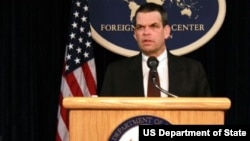Protesters organized by the Zanu PF on Wednesday disrupted a public meeting where U.S. Ambassador Bruce Wharton was scheduled to speak.
A group of over 100 youths, war veterans and war collaborators gathered outside the Turner Memorial Library in Mutare, where Mr. Wharton was going to make prepared remarks marking the establishment of an “American Corner” at the library.
The protest reportedly prompted the American representative to Zimbabwe to abandon the engagement.
The protesters waved placards and shouted at the ambassador and his entourage, denouncing the US over what they called “illegal sanctions” against Zimbabwe.
Some of the placards read, “Wharton Takura Tumukwende Twako Udzokere (Wharton: pack your bags and go)”. As part of the protest, some of the men and women in the crowd removed their clothes in the presence of the ambassador.
Protesters threatened non-state journalists at the event, saying they assault anyone who approached the protesters, took photographs, or asked questions.
After abandoning the public meeting in Mutare, the ambassador’s first trip to Manicaland since assuming the position last November, Mr. Wharton told VOA Studio 7 that he wanted to engage the people of Mutare in what he called a “more sober manner.”
He said he respects the protesters’ freedom of expression, but that he was also entitled to express his views and engage the people of the eastern border city.
Wharton said he was disappointed by what happened, and characterized the incident as a small group denying the majority their right to helpful information. The ambassador said he remained hopeful that he would find time to express his views in the near future.
Soon after the protests, the U.S Embassy released a statement stating that the United States values the right to peaceful protest, noting it as a “critical element of democracy,” but regretted that the roughly 130 protestors were unwilling to engage the ambassador in a conversation.
The Embassy’s statement said Mr. Wharton spent about 15 to 20 minutes listening to the protestors’ verbal and written messages, but there was no opportunity for “constructive conversation.”
The ambassador wrote on twitter that it was “good that [the] right of peaceful protest [is] honoured for this group. Hope others enjoy [the] same.”
Ambassador Wharton was in Manicaland intending to visit projects supported by USAID and meet with businesspeople, academics, local authorities, and citizens.
Efforts to speak with protesters about their anger over sanctions or other aspects of the protest were met with threats. Others who came to the library hoping to hear the ambassador speak, on the other hand, criticized the group.
Mutare resident Evan Gwaku called the protest “embarrassing” and unnecessary.
Moses Semwayo of Padare, a non-governmental organization that fights gender-based violence, was harsher in his description of the protest.
In a written statement, Simba Makoni’s Mavambo Kusile Dawn party also criticized the disruption of the gathering.
Ambassador Wharton is scheduled to visit another U.S-funded project in Mutare Thursday.
A group of over 100 youths, war veterans and war collaborators gathered outside the Turner Memorial Library in Mutare, where Mr. Wharton was going to make prepared remarks marking the establishment of an “American Corner” at the library.
The protest reportedly prompted the American representative to Zimbabwe to abandon the engagement.
The protesters waved placards and shouted at the ambassador and his entourage, denouncing the US over what they called “illegal sanctions” against Zimbabwe.
Some of the placards read, “Wharton Takura Tumukwende Twako Udzokere (Wharton: pack your bags and go)”. As part of the protest, some of the men and women in the crowd removed their clothes in the presence of the ambassador.
Protesters threatened non-state journalists at the event, saying they assault anyone who approached the protesters, took photographs, or asked questions.
After abandoning the public meeting in Mutare, the ambassador’s first trip to Manicaland since assuming the position last November, Mr. Wharton told VOA Studio 7 that he wanted to engage the people of Mutare in what he called a “more sober manner.”
He said he respects the protesters’ freedom of expression, but that he was also entitled to express his views and engage the people of the eastern border city.
Wharton said he was disappointed by what happened, and characterized the incident as a small group denying the majority their right to helpful information. The ambassador said he remained hopeful that he would find time to express his views in the near future.
Soon after the protests, the U.S Embassy released a statement stating that the United States values the right to peaceful protest, noting it as a “critical element of democracy,” but regretted that the roughly 130 protestors were unwilling to engage the ambassador in a conversation.
The Embassy’s statement said Mr. Wharton spent about 15 to 20 minutes listening to the protestors’ verbal and written messages, but there was no opportunity for “constructive conversation.”
The ambassador wrote on twitter that it was “good that [the] right of peaceful protest [is] honoured for this group. Hope others enjoy [the] same.”
Ambassador Wharton was in Manicaland intending to visit projects supported by USAID and meet with businesspeople, academics, local authorities, and citizens.
Efforts to speak with protesters about their anger over sanctions or other aspects of the protest were met with threats. Others who came to the library hoping to hear the ambassador speak, on the other hand, criticized the group.
Mutare resident Evan Gwaku called the protest “embarrassing” and unnecessary.
Moses Semwayo of Padare, a non-governmental organization that fights gender-based violence, was harsher in his description of the protest.
In a written statement, Simba Makoni’s Mavambo Kusile Dawn party also criticized the disruption of the gathering.
Ambassador Wharton is scheduled to visit another U.S-funded project in Mutare Thursday.










